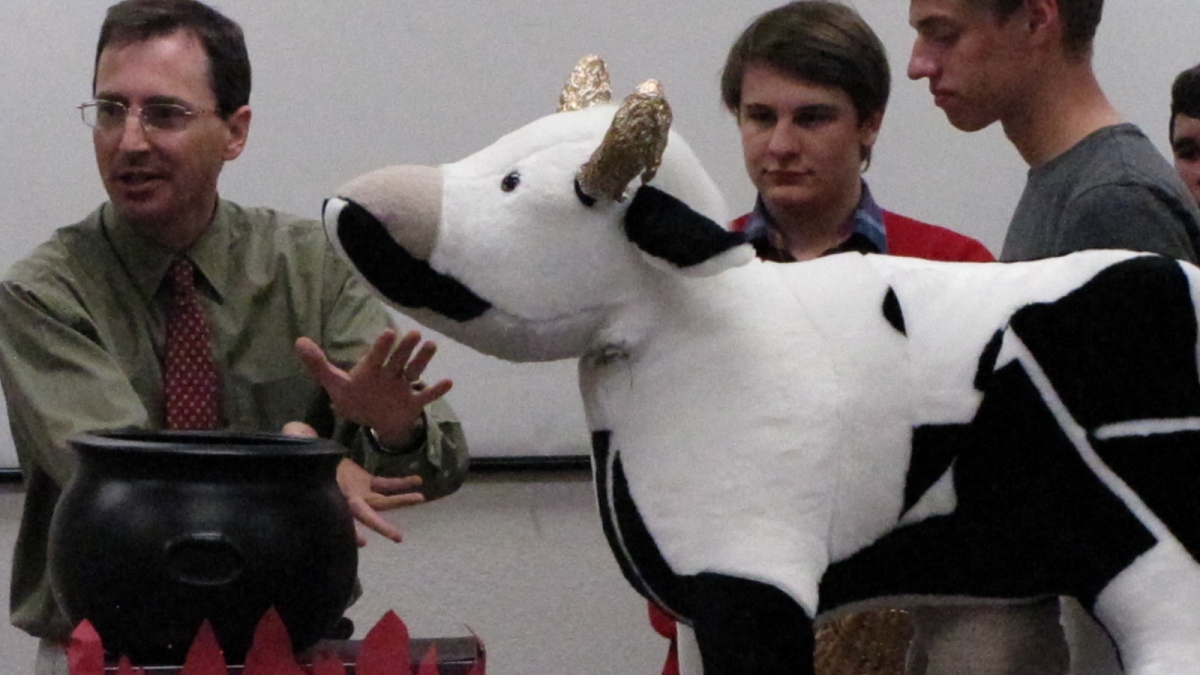How to sacrifice an ox, Roman elections topics at Fall Forum in Classics

On Nov. 16, ASU's School of International Letters and Cultures in the College of Liberal Arts and Sciences will host the third annual Fall Forum in Classics for Arizona high school students. The K-12 outreach program brings over 150 students studying ancient Greek and Latin at their high schools to the Tempe campus for the day to discover what ASU has to offer in Classics education through participating in lectures, games, contests, and creative activities designed to spark interest in the continued study of Classics after high school.
The annual Fall Forum in Classics provides students with interactive, hands-on presentations by ASU classics and archaeology faculty including “How to Sacrifice an Ox,” in which classics professor Mike Tueller demonstrates one of the Greek religion’s most significant acts of animal sacrifice (on a model ox, of course). From the demonstration, students learn how events like this brought the Greek community together, validated their social stratification, and contributed to their views of themselves, animals and the gods in the cosmos.
Other presentations include “Roman Elections,” a mock election demonstrating the biased, sometimes violent, election process of the ancient Romans, and “Why the Dead Sea Scrolls Aren't Really Dead,” in which faculty associate Michael Moore discusses one of the greatest archaeological discoveries of the 20th century, which sheds light on the origins of Judaism and Christianity, the two religions most responsible for creating the ethical value systems at the heart of Western society.
A full schedule of activites is available here.
The Fall Forum in Classics is co-sponsored by the Archaeological Institute of America's Central Arizona Society’s outreach program to K-12 students, Apples + Archaeology, and by School of International Letters and Cultures undergraduate classics club, Solis Diaboli.
Apples + Archaeology was created by the Central Arizona Society to fill the huge void of arts and humanities programs in Arizona K-12 schools due to budget cuts. It is a volunteer lecture program in which ASU archaeology and classics professors take the excitement of archaeology and international humanities into primary and secondary school classrooms throughout the valley with the goal to amaze, inspire and invigorate children and teens.
Solis Diaboli brings together ASU students with similar interests in ancient civilizations of the classical world. The club also frequently sponsors lectures by classics professors, holds classics- themed movie nights, organizes tutoring sessions, and participates in fun events like the Homecoming block party toga contest.
The Fall Forum in Classics is also supported by the ASU Archaeological Research Institute, a unit of the School of Human Evolution and Social Change, which serves to preserve archaeological artifacts and associated data, Eta Sigma Phi, a nearly 100 year old National Classics Honorary Society, which promotes interest in classical study among university students, and the Arizona Center for Medieval and Renaissance Studies.
Thanks to these organizations, students will have a chance to win prizes in various competitions including a poster contest, impromptu art contest, and the popular "certamen" trivia contest. The goal of the event is to excite high school students about the classics they are already studying, and to encourage them to continue classics study at ASU after high school graduation.
The School of International Letters and Cultures offers university students a full curriculum in Classical Studies. The Bachelor of Arts in International Letters and Cultures with a concentration in Classics allows students to pursue a traditional degree in classics in a non-traditional way. Students are expected to acquire the traditional skills in the core ancient languages and history (with an emphasis in either ancient Greek or Latin language), but they are also asked to seek out courses in several departments across the university and tailor their degree to whatever aspect of classical scholarship appeals to them. This classics degree, therefore, encourages academic enterprise and intellectual and cultural diversity among individual students.
The School also offers an undergraduate certificate in Classical Studies, which is available to students in any degree program in any field.
Students interested in persuing a Classics major or an undergraduate certificate in Classical Studies at ASU should contact Almira Poudrier at almira.poudrier@asu.edu.